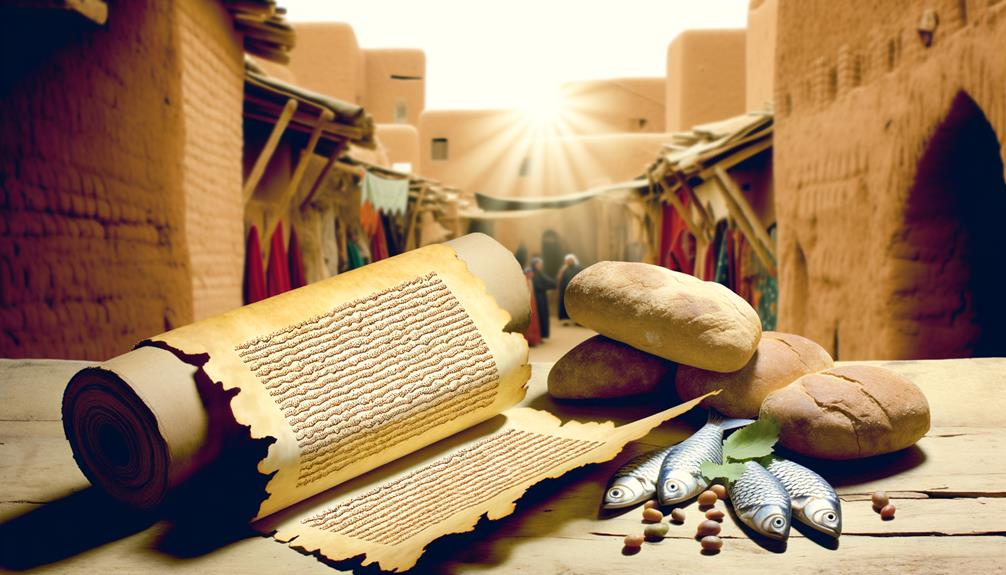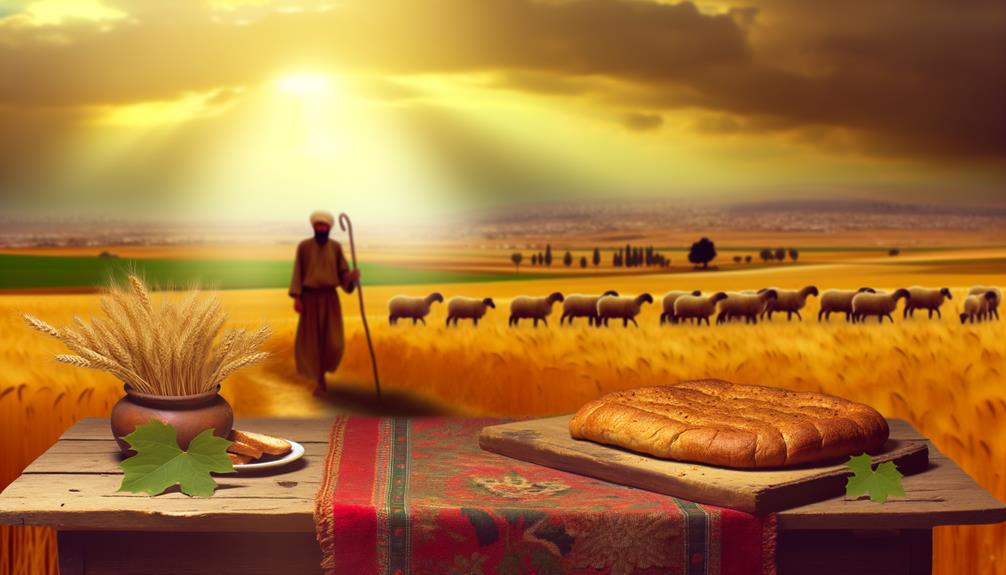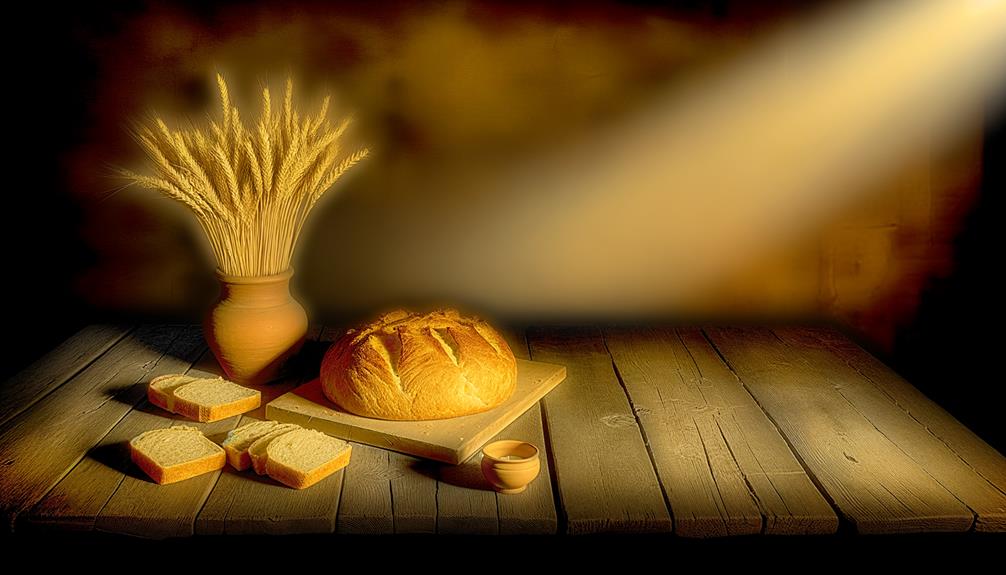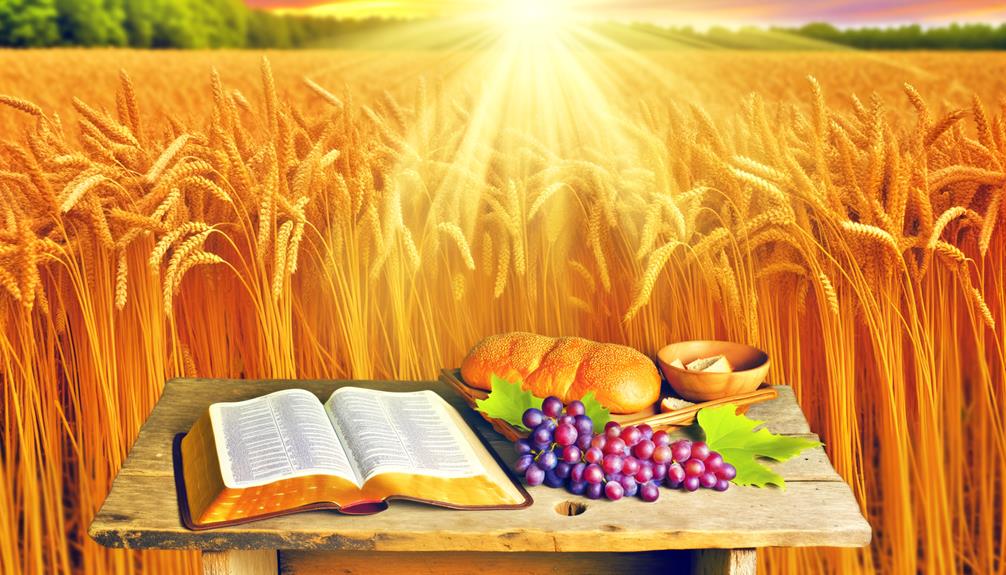I Am the Bread of Life Bible Verse Meaning: Sustenance
When Jesus declares, ‘I am the Bread of Life‘ in John 6:35, He emphasizes His role as the essential and eternal sustenance needed for spiritual fulfillment. This statement follows the miraculous feeding of the five thousand, illustrating His ability to provide both physically and spiritually.
By referencing manna, Jesus connects Himself to divine provision in Jewish history, contrasting it with the eternal life He offers. This metaphor not only signifies Jesus’ provision of everlasting sustenance but also underscores the necessity of an intimate relationship with Him for true spiritual growth.
To uncover deeper theological insights, explore the broader context and themes surrounding this passage.

I Am the Bread of Life Bible Verse Meaning: Spiritual Significance and Insights
| Aspect | Details |
|---|---|
| Bible Reference | John 6:35, John 6:48-51 |
| Literal Meaning | Jesus refers to Himself as the spiritual sustenance that satisfies the hunger of the soul. |
| Spiritual Significance | Emphasizes Jesus as the source of eternal life and the fulfillment of God’s promises. |
| Key Themes | Salvation, eternal life, spiritual nourishment, and faith in Jesus. |
| Symbolism of Bread | Represents sustenance, life, and God’s provision (e.g., manna in the wilderness). |
| Context in Scripture | Jesus addresses the crowd after feeding the 5,000, linking physical provision to spiritual truths. |
| Practical Application | Encourages reliance on Jesus for spiritual fulfillment and eternal hope. |
| Call to Action | Inspires believers to seek Jesus as their source of life and sustenance in faith. |
Biblical Context

In the Gospel of John, the declaration ‘I am the Bread of Life‘ is situated within a broader discourse where Jesus addresses the spiritual sustenance He offers, contrasting it with the temporal satisfaction provided by the manna given to the Israelites in the wilderness.
This statement occurs in John 6:35, following the feeding of the five thousand, an event that underscores Jesus’ ability to meet physical needs. In this context, Jesus emphasizes that He is the bread of life, highlighting the deeper spiritual sustenance He offers beyond mere physical nourishment. His assertion resonates with those who seek fulfillment, as expressed in the poignant phrase, ‘for I was hungry meaning‘ not just a need for food, but a longing for deeper connection and spiritual vitality that only He can provide.
By referencing manna, Jesus engages with Jewish historical consciousness, linking Himself to divine provision.
The context is pivotal: it juxtaposes the transient nourishment of manna with the eternal life Jesus offers.
This passage consequently serves as a bridge between Old Covenant provision and New Covenant fulfillment, inviting a re-interpretation of sustenance in spiritual terms.
Theological Significance

The declaration ‘I am the Bread of Life‘ encapsulates the profound theological assertion that Jesus Himself is the essential and eternal sustenance for human existence, transcending mere physical nourishment. This statement, found in John 6:35, signifies Christ’s role as the source of spiritual energy and eternal life.
Theologically, it underscores the necessity of a relationship with Jesus for spiritual fulfillment, echoing the essential provision of manna in the wilderness as described in the Old Covenant.
By positioning Himself as the Bread of Life, Jesus emphasizes His divine role in providing not just temporary relief but everlasting sustenance and salvation.
This reinforces the New Covenant theme of Jesus as the fulfillment of divine promises and the ultimate source of life.
Symbolism of Bread

Drawing from the theological implications of Jesus as the Bread of Life, the symbolism of bread in biblical tradition provides a rich tapestry of meaning that encompasses sustenance, community, and divine provision.
Bread, as a staple food, signifies physical nourishment, underscoring God’s provision in the wilderness through manna (Exodus 16).
It also symbolizes fellowship and unity, as seen in communal meals and the Last Supper, where Jesus breaks bread with His disciples (Matthew 26:26).
In addition, bread represents divine generosity, evident in the feeding of the five thousand (John 6:1-14), illustrating God’s abundance.
Consequently, bread serves as a multifaceted symbol in biblical texts, pointing to both God’s care for physical needs and His role in fostering spiritual and communal bonds.
Spiritual Nourishment

Recognizing Jesus as the Bread of Life underscores the profound concept of spiritual nourishment, which transcends mere physical sustenance to encompass the fulfillment of one’s deepest spiritual needs.
This metaphor illustrates a dependency on Jesus for spiritual energy, akin to the body’s reliance on bread for physical energy.
In John 6:35, the assertion ‘I am the bread of life’ highlights a continuous, intimate relationship with Jesus as essential for spiritual growth and wholeness.
The metaphor encapsulates the transformative power of divine sustenance, suggesting that genuine contentment and spiritual well-being are attainable only through communion with Christ.
This spiritual nourishment is not a temporal provision but a sustaining force that enriches the believer’s inner life and fortifies their faith.
Eternal Life Promise

Building upon the concept of spiritual nourishment, the declaration ‘I am the bread of life‘ in John 6:35 also carries a profound promise of eternal life for those who partake in this divine sustenance.
This statement, made by Jesus, encapsulates a theological assurance that transcends mere physical sustenance.
By identifying Himself as the essential source of spiritual life, Jesus offers a transformative relationship that promises everlasting communion with God.
The context of this verse, situated within the broader discourse of John 6, underscores the necessity of faith and the acceptance of Jesus’ sacrificial role.
Consequently, the ‘bread of life’ metaphor extends beyond immediate spiritual fulfillment to guarantee an eternal, unending life for believers, rooted in divine grace and truth.
Conclusion
The declaration ‘I am the bread of life‘ encapsulates profound theological significance, symbolizing spiritual sustenance and the promise of eternal life.
Like bread sustains the body, this scriptural metaphor highlights the essential nourishment provided through faith.
By examining its biblical context and symbolism, one comprehends the depth of this assertion, where the bread becomes not merely a staple but a lifeline.
Such an understanding illuminates the transformative power inherent in these sacred words.






